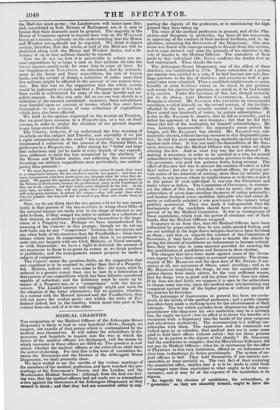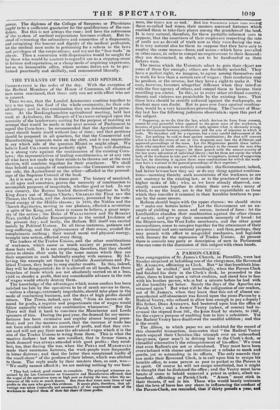MEDICAL CHARITIES.
THE resignation of the Medical Officers of the Aldersgate Street Dispensary is likely to lead to very beneficial effects ; though, we suspect, not exactly of that nature which is contemplated by the medical men themselves. It will induce the subscribers to dispensaries and hospitals to inquire into the way in which the duties of the medical officers are discharged, and the means by which vacancies in those offices are filled up. The question is now raised, whether the medical officers or the subscribers shall have the power of electing. For that this is the bone of contention between the Governors and the Doctors of the Aldersgate Street Dispensary, we shall presently show. We have waited to see the results of the various meetings of the members of the medical profession, and have watched the proceedings at the Freemason's Tavern, and the London, and the Westminster Medical Societies : although from the first our feeling was, that the medical officers bad not made out so triumphant aease against the Governors of the Aldersgate Dispensary as they seemed to. think ; and that they had not succeeded either in sup porting the dignity of the profession, or in maintaining the high ground they have taken up. The voice of the medical profession in general, and of the Physicians and Surgeons in particular, has been all but unanimous in approving of the conduct of their medical brethren, and, by im plication, censuring the Governors of the Dispensary. One man alone was found with courage enough to dissent from this opinion, and to come forward and state the grounds of his objection to the vote of thanks to the Medical Officers. The statement of facts made by this individual (Dr. Es) confirms the doubts that we had entertained. Thus stands the case.
The Aldersgate Street Dispensary, one of the oldest of these charities, was established in 1770. Every subscriber of a guinea per annum was entitled to a vote, if he had become one only four days previous to the day of election ; and proxies as well as personal votes were admitted. Thus a candidate might create as many friendly or even fictitious voters as he chose to pay guineas, and secure his election by purchase, as much as if he had bought it by auction. Under the existence of this law, though certainly not by its abuse, were Doctors CLUTTERBUCK, LAMBE, and BIRKBECK elected. Mr. SALMON, who was twice an unsuccessful candidate, availed himself, on the second contest, of the facilities afforded by the law, and actually created a large number (Dr. Epps stated two hundred) of voters, by guinea subscriptions. It is due to Mr. SALMON to observe, that he did so avowedly, and to defeat his opponent at his own weapons ; but that he did thus abuse this law of the institution, he himself acknowledges. He was, however, unsuccessful : his opponent's purse proved the longer, and Mr. ELLERBY was elected. Mr. SALMON was sub sequently elected, without having recourse to this disgraceful practice; he and his next opponent having mutually agreed not to bid against each other. It was not until the discomfiture of Mr. SAL MON, however, that the Medical Officers who now retire set about altering the law. And in what way was the law altered? By making it necessary, in order to be entitled to a vote, for annual subscribers to have been so for six months previous to the election; life-governors, who paid ten guineas clown, being exempt. The effect of this new law was to prevent the creation of voters at a few days' notice • but also to enable a medical officer, by giving private notice of his intention of retiring, more than six months pre viously, to any person whom he might choose so to favour, to put it in the power of such individual to canvass the Governors and make voters as before. The Committee of Governors, to counteract the effect of this law, abolished votes by proxy, but gave the subscribers of seven days standing the power of voting personally; and further declared every candidate ineligible who had either directly or indirectly solicited a vote previously to the vacancy being publicly announced. They also made it indispensable that the testimonials of the candidate should have been previously approved of by the Medical Committee. It was in consequence of these regulations, which took the power of elections out of their hands, that the Medical Officers resigned.
It appears to us from this, that the Medical Officers have been influenced by pique rather than by any noble-minded feeling, and are not entitled to the high-flown eulogies that have been lavished on them ; and that, as regards the conduct of the Committee of Governors, if they have shown a desire to benefit the charity by giving the friends of candidates an inducement to become subscribers, they have also in some measure provided for securing the due qualification of candidates and fairness in their election. The charges that have been made against some of the Governors appear to have their origin in personal animosity. The steamengine of Mr. HERRING and the open door of Mr. SMITH, if nuisances at all, are nuisances of fifteen years' standing; and as to Mr. HERRING supplying the drugs, he was the successful competitor chosen from many others, for the very sufficient reason, that his drugs were as good and his prices lower than any other. If he does not deal fairly, we suppose it is open to the subscribers to choose some one else, upon the medical men substantiating any complaint against him of the higher prices or inferior quality of the articles he furnishes.
The patronage of dispensaries in general has been too exclusively in the hands of the medical profession ; and a public charity has often been made a stalking-horse for the advancement of their interests. The law which excludes from dispensaries the general practitioner who dispenses his own medicines, may be a salutary one, for aught we know ; but its effect is to throw the benefits of a connexion with a dispensary into the bands of the pure surgeons and physicians exclusively. The remuneration is a trifling consideration with them. The experience and the connexion are looked upon as so valuable, that medical men are in some cases glad to hold their offices without salary : but are these persons likely to do justice to the objects of the charity ? Dr. GREGORY had the confidence to complain that the Marylebone Infirmary did not pay its Medical Officers; when he, in canvassing for the office of Physician to this very institution, offered as an inducement to elect him, to discharge its duties gratuitously. The system of unpaid officers is bad. They hold themselves, if not entirely irresponsible, at least partially so. The very fact of their accepting the unsalaried office, implies that it is to be made to yield them advantages more than equivalent to what ought to be its remuneration; and it may be at the expense of the institution or its objects. As regards the election of candidates, the subscribers, or " governors " as they are absurdly termed, ought to, have the power. The diploma of the College of Surgeons or Physicians ought to be a sufficient guarantee for the qualifications of the can&date. But this is not always the case; and here the rottenness of the system of medical corporations becomes evident. But instead of censuring the subscribers and committee of a dispensary, and eulogizing the honour and dignity of the medical profession, let the medical men unite in petitioning for a reform in the laws and privileges of the corporations; and cry out fbr " free trade" in physic. Then a connexion with dispensaries would be sought for by those who would be content to regard it not as a stepping-stone to fortune and reputation, or a cheap mode of acquiring experience, but as an honourable office, whose serious duties are to be performed punctually and skilfully, and remunerated liberally.





















 Previous page
Previous page